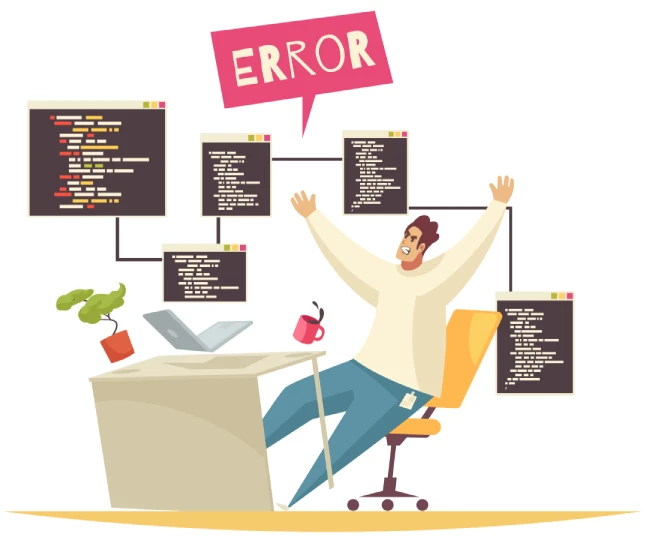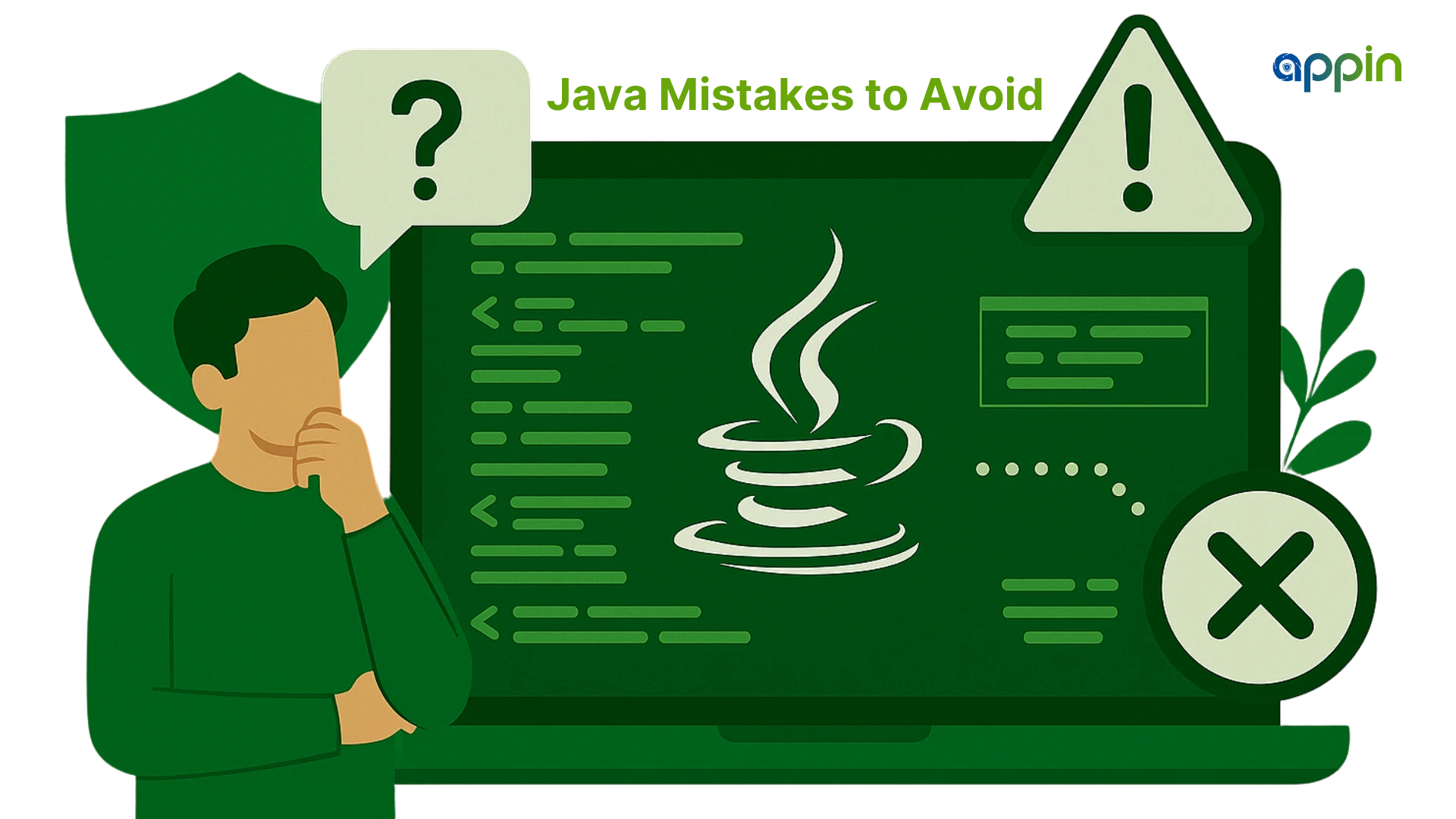Java is one of the most popular programming languages in India, especially for students preparing for tech jobs. From Android apps to backend systems, Java is used everywhere. But while learning it, beginners often fall into the same traps. These common Java mistakes can slow down progress and make concepts harder to understand later.
If you’re just starting your Java journey, avoiding these mistakes can help you:
- Learn faster and more confidently
- Write cleaner and more reliable code
- Perform better in interviews and coding tests
In this blog, we’ll break down six common mistakes many beginners make while learning Java. Each section will explain what the mistake is, why it matters, and how to fix it with simple examples and tips. Whether you’re learning through classes, YouTube, or practice, this guide will keep you on the right path.
Let’s get started!
Mistake 1 – Skipping the Basics of Java Syntax
One of the most common Java mistakes students make is jumping into complex code before mastering the Java syntax basics. Java is strict with rules. Missing even a small detail can cause your entire program to fail.
Here are some common syntax errors beginners often make:
- Missing semicolons at the end of statements
- Forgetting opening { and closing } braces
- Using incorrect variable names or Java keywords
- Not matching parentheses in conditions or loops
Example:
public class HelloWorld
public static void main(String[] args)
System.out.println(“Hello, Java!”);
This code will throw an error because it’s missing {}, semicolons, and the structure is broken.
Tip: Always take time to understand how Java code is structured. Practice writing clean, small programs and review each line.
Also, if you’re planning to explore fields like ethical hacking or app security later, it’s important to build your coding fundamentals first. Syntax is the foundation of everything that comes next.
Mistake 2 – Not Understanding OOP Concepts
Another common Java mistake is ignoring the core idea that makes Java so powerful: Object-Oriented Programming (OOP). Java isn’t just about writing code. It’s about thinking in terms of objects and how they interact.
Many beginners try to learn Java without understanding basic OOP terms like:
- Class – a blueprint or template (e.g., Car)
- Object – a real-world example based on a class (e.g., your red Honda City)
- Inheritance – sharing code from one class to another (like traits passed from parents to children)
- Encapsulation – hiding details and showing only what’s needed
- Polymorphism – same action, different forms (like sending a message in different apps)
Skipping OOP leads to confusion later, especially when you start building real projects.
Tip: Start small. Create a class and object for something simple like a student or book.
If you’re planning a career in cybersecurity, mastering Java OOP for beginners gives you a strong coding base. This is especially useful for backend logic and automation used in our Certified Ethical Hacking Course.
Mistake 3 – Writing Everything in the Main Method
One of the most common Java mistakes beginners make is putting all their code inside the public static void main(String[] args) method.
Yes, the main method is where Java starts running your code. But writing everything in it quickly becomes messy and confusing. Imagine trying to build a full application with hundreds of lines in one block, hard to manage, right?
Here’s why it’s a problem:
- Code becomes harder to debug
- Reusability is almost zero
- You can’t grow your project efficiently
What to do instead:
Break your code into small functions or methods
Group related actions together
Think in terms of Java modular programming
This habit will help you become a cleaner, smarter coder. It’s also important if you plan to work in areas like ethical hacking, where structured coding is a must. We explore this deeply in our C|EH v12 Ethical Hacker Course, where code clarity is critical for security tools.
Mistake 4 – Not Practicing Error Handling
Many Java beginners avoid using try-catch blocks because they don’t fully understand them. But skipping Java exception handling is a big mistake.
Why? Because real-world programs don’t always run perfectly. Errors happen. Users give wrong input, files go missing, and network calls fail. If you don’t plan for these issues, your app will crash.
Understanding how to catch and handle exceptions:
- Makes your programs safer
- Helps with debugging and problem-solving
- Builds confidence as a developer
Here’s a simple example:
try {
int result = 10 / 0;
System.out.println(“Result: ” + result);
} catch (ArithmeticException e) {
System.out.println(“Error: Cannot divide by zero.”);
}
Without the try-catch block, this program would crash. With it, the error is handled smoothly.
If you’re planning a career in cybersecurity or ethical hacking, handling exceptions is even more important. It is a skill we sharpen in our Bug Bounty Diploma program, where safe coding is key.
Mastering this early makes you a more confident and capable Java developer.

Mistake 5 – Avoiding Practice and Only Watching Videos
One of the most common mistakes Java learners make is spending hours watching tutorials but not writing any code themselves. Videos can explain concepts, but you won’t learn Java until you practice.
Learning programming is like learning to swim. You can watch a hundred videos on swimming, but unless you jump into the water, you won’t learn how to move.
If you avoid practice:
- You will forget syntax quickly
- You won’t learn how to fix errors
- You will struggle to build real programs
Here’s what you should do instead:
- After every topic, write two or three small programs on your own
- Try solving basic problems on platforms like HackerRank or CodeChef
- Start a mini project (like a calculator, student database, or quiz app)
- Do not worry about perfect code. Just get started
This hands-on Java programming practice builds confidence and helps you remember better. The more you code, the easier it gets.
Even 30 minutes of practice every day can make a huge difference in your progress.
Mistake 6 – Not Using Comments and Code Formatting
Another common Java mistake beginners make is writing code that is hard to read. When your code looks messy, even you might not understand it later. Good formatting and comments make your work easier to review, debug, and improve.
Here’s what usually goes wrong:
- No indentation or spacing between code blocks
- Long methods with no comments
- Confusing variable names like x1, temp, abc
Why code formatting and comments matter:
- Helps others (and future you) understand your logic
- Makes projects look professional
- Reduces errors and improves debugging
- Important in job interviews and coding tests
Tips to improve your Java code readability:
- Use inline comments to explain tricky lines
- Add a short comment before each method
- Follow indentation (use tabs or spaces consistently)
- Use meaningful variable names like totalMarks, userName
- Leave a blank line between different code blocks
Following simple rules of formatting and writing helpful comments will take your Java code readability to the next level. This small habit builds good discipline for real-world programming.
Conclusion
Learning Java can be exciting, but beginners often make mistakes that slow down their progress. Let’s quickly recap the common Java mistakes for beginners:
- Skipping basic syntax rules
- Not understanding object-oriented concepts
- Writing everything in the main method
- Ignoring error handling
- Watching videos without coding
- Writing messy, unreadable code
If you’re just starting out, remember that Java is a skill you build step by step. It’s okay to take your time, make small mistakes, and learn through practice.
Here’s how to stay on track:
- Practice coding daily, even if it’s just 30 minutes
- Review your own code and fix small issues
- Ask questions and learn from others
- Focus on concepts, not just copying code
If you need help, Inquire Now to connect with mentors at Appin who can guide you through real learning, practice sessions, and certifications.
Learning Java the right way today can open the door to tech careers tomorrow.


